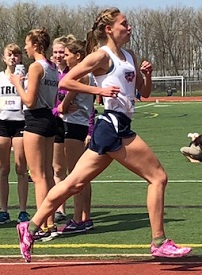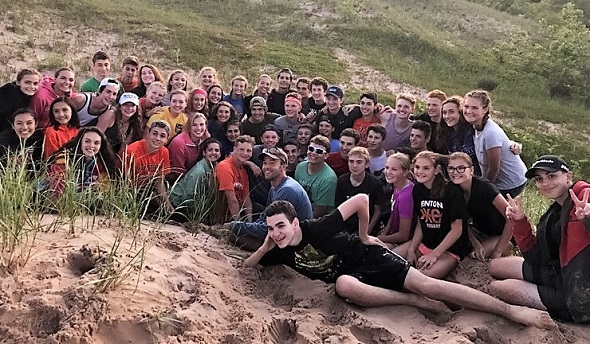
Performance: Hanover-Horton's Judy Rector
September 13, 2018
 Judy Rector
Judy Rector
Hanover-Horton senior – Cross Country
The Hanover-Horton senior has returned from injury to become a two-time MHSAA Finals track champion, and she’s surged into her senior cross country season pacing among the state’s elite in that sport as well. Rector ran a personal-record 18:07.7 on Saturday to win the Class 3 race at Bath’s Bret Clements Invitational and also best the winners of the event’s two larger-school races, earning her the first Michigan Army National Guard “Performance of the Week” for 2018-19.
Saturday was the second time in four races this fall that Rector lowered her personal record, and she’s now dropped 37 seconds from her fastest finish of 2017. As a sophomore, Rector began suffering from slipping rib syndrome – one of her ribs would pop out of place, causing intense pain. She was forced to take six months off from running and missed her track & field season that spring while undergoing physical therapy. She ran again for the first time on the day of the 2017 MHSAA Track & Field Finals, built back her strength for cross country last fall and finished 10th in Lower Peninsula Division 3, and then won the 800 and 1,600-meter LPD3 track championships this spring.
 Rector’s winning time at Bath bested the lineups from the top-ranked teams in both LPD1 and LPD2, plus racers from five more teams ranked among the top 10 in those divisions. She’s got big goals for the rest of this senior year. She’s aiming to run 17:30, which would break the school cross country record set by 2012 graduate Lindsey Burdette, and finish top-three at this fall’s Finals and qualify for the Foot Locker national competition. Next spring, she’ll try to repeat in the 800 and 1,600 and make a run at the 3,200 as well. With only one A- scratching an otherwise perfect academic record, Rector is carrying a 3.99 grade-point average, tied for sixth in her graduating class. She’s still figuring out where, but she’s planning to study biology and continue her running career at the collegiate level.
Rector’s winning time at Bath bested the lineups from the top-ranked teams in both LPD1 and LPD2, plus racers from five more teams ranked among the top 10 in those divisions. She’s got big goals for the rest of this senior year. She’s aiming to run 17:30, which would break the school cross country record set by 2012 graduate Lindsey Burdette, and finish top-three at this fall’s Finals and qualify for the Foot Locker national competition. Next spring, she’ll try to repeat in the 800 and 1,600 and make a run at the 3,200 as well. With only one A- scratching an otherwise perfect academic record, Rector is carrying a 3.99 grade-point average, tied for sixth in her graduating class. She’s still figuring out where, but she’s planning to study biology and continue her running career at the collegiate level.
Coach Dean Blackledge said: “We knew we had a special athlete when she was a freshman. The only one who didn't know was Judy. It took her a while to really understand she's as good as she is. A year and a half ago she was really in the dumps, the whole thing, because she couldn't run. … (But) we worked though the difficult times for her, spent an awful lot of time together, and she got it. When she did finally get through it, she just blossomed into the runner that I always thought she was going to be. She’s just tough in training and self-discipline. When you talk about a cross country runner, the main thing more than in probably any other sport is a cross country runner has to be self-disciplined. They have to get up and run five or six or 10 miles or whatever when other kids are sleeping or whatever, and they have to do that year-round almost. She’s been that kind of athlete. When we do a workout we go out on the roads sometimes to run, and they can cut corners whenever they want and the coach would never know. I don’t think Judy has ever cut a corner. … She’s just a great leader. She has humility, and it’s tough to get an athlete as good as she is that doesn’t boast about themselves. If you want to know something about Judy, you have to talk to somebody else. She won a couple of state championships in equestrian, and I didn’t know that until 2-3 weeks ago – and I’ve been her coach, been close to her, and she’s never said a word about it.”
Performance Point: “My goal going into (Bath) was actually to try to get under 18 (minutes),” Rector said. “Last year when we ran at Bath, I didn't run very well. I was really sick, so this year I wanted to put up a good time because I knew from last year that it was a good course to run. Fortunately it was a lot cooler in the morning, a lot better running weather than we had earlier that week on Wednesday. I was like, we're going to try to maintain a 5:45 split, which would put me just under 18. I have a tendency to go faster at the beginning of my races, and I thought if I tried to even-split it more that it would be better. At the 2-mile I was at 11:35, 11:40, so I knew I was running well at that point. It was just trying to finish going into the last mile. I knew where I was at time-wise, but more than anything I kept seeing my teammates, like the last mile. There were the boys and some of the JV girls – every time I saw them, it makes it easier to keep going. Your teammates are there and they're cheering you on, and they want you to do well. That picked me up a lot for the last part of the race too.”
Comeback trail: “For me, that was a really hard thing. Before I got injured, running was something I enjoyed and I was fairly good at. But when you're supposed to be going to rehab and doing all of those things, you really have to put yourself into it 110 percent. When they ask you to do things like the exercises and stuff, I was like, This is crazy. No way.’ They're like, it will help you. ... Having goals helped me because I'm a really goal-driven person. So coming out of that and not being able to run, I knew I valued it a lot more, just being able to go outside and being able to run and having the ability to do that because some people don't even have that. Having it in my head that I didn't want to take anything else for granted – every time I did a workout or went out to run, it was the best effort that I could do.”
 Finding form: “Last summer was just trying to build up to where I was in the high 18s. This (spring’s) track season was huge for me and getting me the confidence that I could be running faster, not just short distance things but cross country too. Over the past year I've worked a lot on my form and a lot more on basic strength, the little things that I didn't necessarily do before. So I feel a lot more smooth when I'm running.”
Finding form: “Last summer was just trying to build up to where I was in the high 18s. This (spring’s) track season was huge for me and getting me the confidence that I could be running faster, not just short distance things but cross country too. Over the past year I've worked a lot on my form and a lot more on basic strength, the little things that I didn't necessarily do before. So I feel a lot more smooth when I'm running.”
Back on track: “After taking all of that time off, I started running on the day of the (track) state meet a year ago – so it would've been a full year from not being able to run to starting running, to the day I won those two championships. It was really emotional. I never would've imagined being able to do all of that in a year. ... It had always been a goal I had to maybe run and win a state championship, but that I was able to do it, in that amount of time, I was just so happy and proud.”
Future path: “(I’d like to become) a pathologist, someone who researches and studies diseases. I really like science classes. Last year I took a microbiology class that was more based on studying diseases, and we took samples of things from around our school and looked at them and ran tests on them, and I thought was super cool. If I could do something like that or in the medical field, that's a long-term goal for me.”
- Geoff Kimmerly, Second Half editor
Every week during the 2018-19 school year, Second Half and the Michigan Army National Guard will recognize a “Performance of the Week" from among the MHSAA's 750 member high schools.
The Michigan Army National Guard provides trained and ready forces in support of the National Military Strategy, and responds as needed to state, local, and regional emergencies to ensure peace, order, and public safety. The Guard adds value to our communities through continuous interaction. National Guard soldiers are part of the local community. Guardsmen typically train one weekend per month and two weeks in the summer. This training maintains readiness when needed, be it either to defend our nation's freedom or protect lives and property of Michigan citizens during a local natural disaster.
PHOTOS: (Top) Hanover-Horton's Judy Rector leads the way during a race this fall. (Middle) Rector powers down the straight-away during the Track Finals this spring. (Photos by Joe Childs and Marlissa Shepherd, respectively.)

Anderson Shows Way for Fenton Runners
By
Paul Costanzo
Special for MHSAA.com
October 10, 2018
The runners on the Fenton girls and boys cross country teams admired and respected coach Jesse Anderson before he placed 20th overall at the 2018 Boston Marathon.
 But that performance definitely didn’t hurt his credibility.
But that performance definitely didn’t hurt his credibility.
“Like everyone else on the team, I was shocked and very proud when I heard the news,” Fenton senior Nolan Day said. “It’s so crazy to think that our coach that we see every day took 20th out of 30,000 in one of America’s most prestigious marathon races. We all feel very lucky to have him as a coach as it is, and this just adds to it.”
Anderson, who finished the marathon in 2 hours, 29 minutes and 19 seconds, is in his fourth year as coach at his alma mater. The 2008 graduate was a two-time all-state finisher and four-time MHSAA Finals qualifier for the Tigers. While he didn’t run competitively while attending University of Michigan, he wound up picking the sport back up on his own and competed in road races before making the jump to marathons in 2013.
“The (Fenton) position came open in 2015, and I was encouraged to apply for the spot because I was running a business in town and I had picked up competitive running at the time after college,” Anderson said. “I cared a lot about the program and wanted to have an impact at that level. It has surpassed my expectations.”
In his first three seasons, the Fenton boys have qualified twice for the Division 1 Finals (2015 and 2017), and the girls qualified in 2017. Both teams are projected to finish first in their regions by Athletic.net, although the boys hypothetical Regional meet sees the Tigers tying Highland Milford for first and just one point ahead of Walled Lake Central. On the girls side, junior Alexa Keiser – who earned all-state finishes in both of her first two seasons at Fenton – has a top time this fall that once again would put her on stage at Michigan International Speedway on Nov. 3.
Anderson gives a lot of the credit for the team’s success to his assistant coaches, Sue Larsen and Nathan Loersch.
“I couldn’t do what I do without those two,” he said.
He also said that both his experience as a high school runner and as a currently competitive runner are what he’s needed to be a complete coach.
“They kind of go hand in hand,” he said. “When I’m talking to the kids and communicating a workout, my experience as a runner in high school is more valuable, especially when it comes to racing tactics,” he said. “But training to be consistent over road races has really taught me about making consistent habits. I wouldn’t feel as complete as a coach without one or the other experience.”
 While Anderson acknowledges training for marathons is different than training for 5Ks, he also points out that there are plenty of similarities, which his experiences make him uniquely qualified to see.
While Anderson acknowledges training for marathons is different than training for 5Ks, he also points out that there are plenty of similarities, which his experiences make him uniquely qualified to see.
The mileage an athlete is running per week may be different, but he said the rhythm of that week – when to rest, what to work out – is very much the same. And, of course, he has a willing participant to test the effectiveness of his workouts – himself. That helps him communicate why his high school athletes are running what they’re running, and what it will do for them, something Anderson feels very strongly about.
His athletes appreciate all of the experience he brings to the table.
“As a person and a coach, we think very highly of him, and his decorated running resume backs his already trustworthy judgment and advice,” Day said. “Just when I think that I couldn’t have any more respect for him as a person and as a coach, his achievements keep on grabbing even more of my respect.
“When it comes to relating to his runners and understanding what they are going through, Coach Anderson’s skills are unparalleled. He knows the stretches and fixes for every injury, and knows how to push his runners to their highest potential while not being detrimental. For these reasons, among many others, I truly feel Coach Jesse Anderson is the best cross country coach in the state of Michigan.”
Of course, not all of Anderson’s lessons are taught from his successes. In 2013, he attempted for the first time to run the Boston Marathon and had to drop out. It’s the only race, Anderson said, he’s hasn’t finished.
“I didn’t prepare very well,” he said. “I was in the midst of starting up a business in town, and I had kept myself busy that weekend and drove out the day before. I didn’t drink enough water. I drank too much coffee. I made a lot of mistakes, and I use it as an example now for coaching.”
The 2013 race also served as a personal learning experience as Anderson prepared for the 2018 marathon, helping him to his biggest triumph at the site of what was previously his rare racing failure.
It was made more special by the group of Fenton runners he has been mentoring seeing that success.
“They’ve always been super supportive, and it was really heartwarming to have a bunch of people reach out to me,” he said. “I really try not to make too much out of it because a lot of circumstances went into being able to place that high, but I would like to think I was just trying to practice what I preach to the kids. This wasn’t the result of some Herculean effort. That said, it was pretty cool, and Boston is pretty recognizable to most people, so it was really cool to see the kids get excited about it.”
 Paul Costanzo served as a sportswriter at The Port Huron Times Herald from 2006-15, including three years as lead sportswriter, and prior to that as sports editor at the Hillsdale Daily News from 2005-06. He can be reached at [email protected] with story ideas for Genesee, Lapeer, St. Clair, Sanilac, Huron, Tuscola, Saginaw, Bay, Arenac, Midland and Gladwin counties.
Paul Costanzo served as a sportswriter at The Port Huron Times Herald from 2006-15, including three years as lead sportswriter, and prior to that as sports editor at the Hillsdale Daily News from 2005-06. He can be reached at [email protected] with story ideas for Genesee, Lapeer, St. Clair, Sanilac, Huron, Tuscola, Saginaw, Bay, Arenac, Midland and Gladwin counties.
PHOTOS: (Top) Fenton coach Jesse Anderson is surrounded by his runners during their preseason camp at Sleeping Bear Dunes. (Middle) Anderson crosses the finish line 10th at the Aug. 25 Crim 10-mile run in Flint. (Top photo courtesy of Fenton cross country, middle by RunMichigan.com.)

